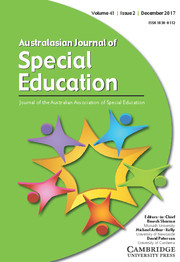No CrossRef data available.
Article contents
Choosing an Early Intervention Program for Hearing Impaired Children
Published online by Cambridge University Press: 26 February 2016
Abstract
Hearing parents of young children newly diagnosed with a hearing loss typically know little of this condition or how it can best be managed. Information and assistance is available through early intervention programs. However, these take a variety of forms and offer different, sometimes conflicting, philosophies. The selection of an early intervention program is an important choice and one which requires parents to collect and assimilate large amounts of information and opinion. This must be done during what is, for most, a highly traumatic period. It is generally accepted that parents should make the major choices for themselves and their children, rather than have them made for them by experts, but that this should be done in a collaborative manner. This requires that the relevant experts are able and willing to provide information and advice which is balanced, comprehensible, and appropriate to the needs and abilities of the parents - that is, information and advice which is helpful. This study surveyed parents who had been through the early intervention process to identify the sources from which they obtained their information, and their perceptions of the helpfulness of the information provided.
- Type
- Research Article
- Information
- Copyright
- Copyright © The Australian Association of Special Education 1995


